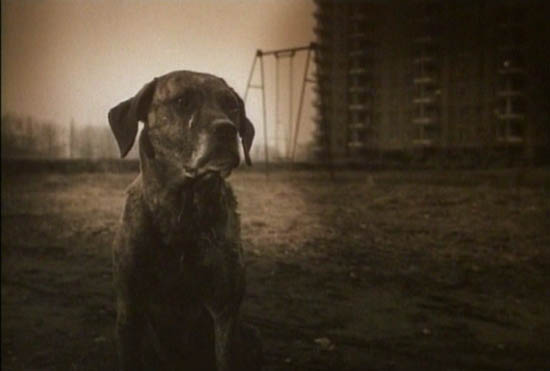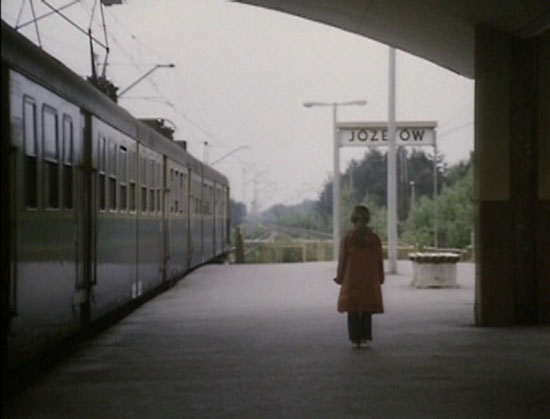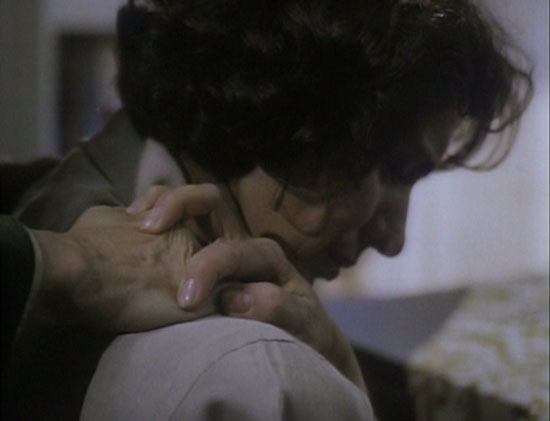Commandment I: I Am the Lord Thy God
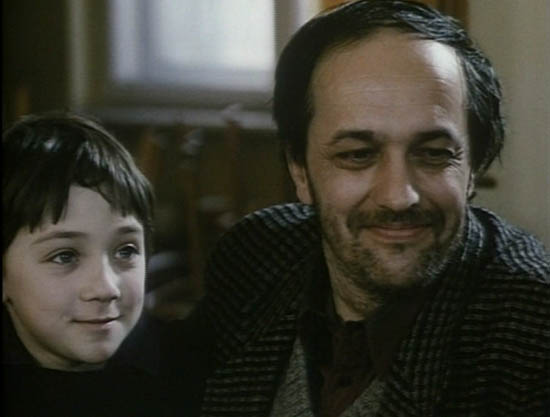
Boy lives alone with his father. They love (erm, “worship”?) their all-knowing computer, which calculates that the ice outside is thick enough to skate on. Kid’s aunt thinks the kid should have a more spiritual education, but dad disagrees because science and computers are where it’s at. Needless to say, the ice was not thick enough to skate on.
Sad, cold, dreary, dark episode, opens with a sad man sitting in front of a fire by the lake. DVD extras say that we’ll see him again. Starts/ends with the aunt watching TV news broadcast showing the kid running through school hallway with other kids a few days before the ice incident. Maybe this was a fine episode to begin the series theatrically, when you’re sitting wondering what’s coming next, but on DVD, I was bummed by this one (and by the circumstances of trying to watch it) so it took over a month before I made it to part 2.
The sad man acted in Kieslowski’s No End. The kid is my age, appeared in Schindler’s List.

———————————-
Commandment II: Thou Shalt Not Take the Name of Thy Lord God in Vain

Sad woman’s husband is deathly sick, is neighbor to sad doctor whose family died in bombing years ago. Doctor does his best, but it’s not looking good for husband. Thing is, wife needs to know if he will live or die, because she’s pregnant from another man and wants to know whether to keep the baby.
The episode might’ve seemed grim and dreary if it hadn’t followed the dead-child segment. Both were pretty affecting, but this one sucked me right in. Kind of a soapy sounding plot, but Kieslowski obviously not a soapy director, so it works. Doctor warms up to the wife, finally tells her the husband will almost certainly die, she phones boyfriend and breaks up with him (more or less) but keeps the baby and stays with the husband, who improves against all odds. Lot of close-ups, more dead animals and warm clothes, no sign of the sad man by the lake who introduced the series.
The doctor (above) played lawyers in both White and No End. The woman (below) starred in Wajda’s Man of Iron and in something called Life as a Fatal Sexually Transmitted Disease.

———————————-
Commandment III: Honor the Sabbath Day
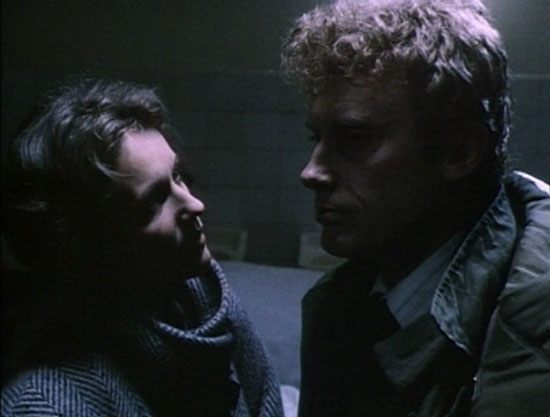
Cab driver’s ex shows up on Christmas eve and leads him on a wild goose chase, supposedly looking for her missing husband. In fact, her man left three years ago, and she is so lonely over the holidays that she tricks her ex into spending time with her. He catches on to some of the lies, maybe all of them, but he comes along anyway and returns to his own wife at daybreak.
A weird one, all deception with little truth about the background of these two and their former relationship… unless their past was mostly deception. I liked it, but not one of my favorites.
The woman is from No End. The cab driver appeared in The Unbearable Lightness of Being, currently a soap opera star.
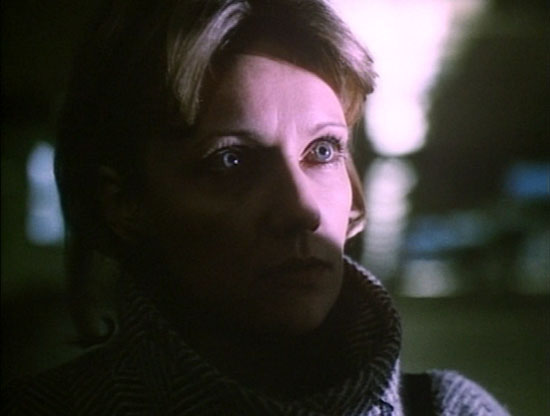
———————————-
Commandment IV: Honor Thy Father and Mother
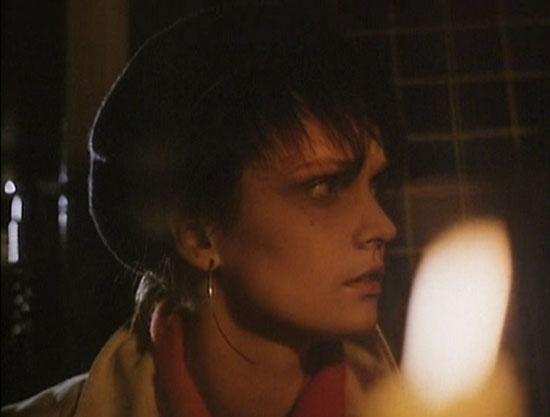
When Anka’s dad Michal goes out of town, she opens a letter marked “to be opened after my death.” Dad comes home and she shows him the sealed letter inside, in her dead mother’s handwriting, telling Anka that Michal is not her real father. Anka says that she’s always felt this to be true, and suggests they could be lovers instead of father and daughter. He doesn’t go for it… but Anka is toying with him, having written the letter herself and never opened the real letter (although the real letter very likely says the same thing).
Oh good, a real crazy one. Was Anka serious about any of it or was she only trying to expose her father? I liked it, though I started pondering alternate titles for the Decalogue and came up with Sad People Telling Secrets & Lies In The Dark. Sums up the last three pretty well. Our mysterious young man makes an appearance, carrying a white canoe.
The “father” was third-billed in Kieslowski’s White.

———————————-
Commandment V: Thou Shalt Not Kill

An antisocial youth, an antisocial taxi-driver and an idealistic young defense lawyer collide Crash-style. Youth is tired of dropping rocks off overpasses, damaging property and pushing men into urinals, decides to kill a taxi driver. Gets sent through the justice system, where our lawyer passionately but unsuccessfully defends him, finally hangs for his crime.
Good story, one of the more obvious and political ones. I mean, thou shalt not kill, you know? The sad young man shows up right before the murder, giving our antisocial youth a pleading look. I’d kinda prefer if this guy was obliviously walking through all ten tales, rather than acting like a helpless Wim Wenders angel all the time.
The cinematographer Slawomir Idziak (who had worked with Kieslowski before on The Scar) went hog wild on this one, filming the whole first half in sepia tones with encroaching shadows around the edges. It worked out well for him – he was hired back for the gorgeous Double Life of Veronique and Blue, and later did Gattaca, Black Hawk Down and the latest Harry Potter.
The beginning of the young lawyer and criminal’s acting careers, but veteran actor Jan Tesarz (the murdered taxi driver) went on to appear with Bruce Willis and Colin Farrell in Hart’s War. I recognized the woman with the dying husband from episode 2 as a would-be customer from whom the taxi driver speeds away.
They arrested the wrong guy for the murder! Check out the white chalk “M” on the shoulder of the guard at Jacek’s right arm:
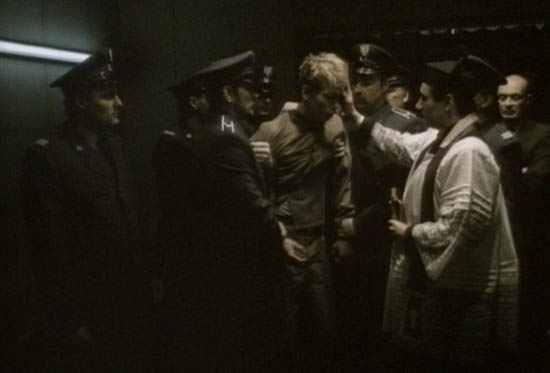
———————————-
Commandment VI: Thou Shalt Not Commit Adultery

A more conventionally shot episode, a voyeur movie that watches us watch it. Tomek, who lives with his “godmother” (his absent best friend’s mom) spies on Magda through a telescope every night, and stalks her in various other ways. She either warms up to the idea or decides to fuck with him, I haven’t figured which, and gets him over to her place one night for just a few minutes… after which he runs home and tries to kill himself. She is crazy with worry, finally he resurfaces and I guess he has gotten over her.
Extended version, A Short Film About Love, apparently has a different ending. This episode and the previous one (which also has an extended theatrical version) were both letterboxed.
Magda starred in No End, Tomek was Kieslowski’s assistant director on half the Decalogue episodes, and the godmother died in April ’88 – this was her last role.

———————————-
Commandment VII: Thou Shalt Not Steal

Lot of close-ups in this one. Young mother Majka and daughter Ania live with Majka’s mother Ewa (Anna Polony) and father (Wladyslaw Kowalski, star of that ugly live-cartoon movie Avalon). Elder Ewa treats little Ania as if she was daughter, not granddaughter, and Ania doesn’t even know Majka is her real mother. Majka solves this by kidnapping her own six-yr-old daughter during an outing and running away to the house of her former lover & high school teacher, now a teddy bear maker, giving it a sort of fairy-tale edge from the kid’s perspective. In the end Ewa gets the kid back but Majka flees on a train, and we’re left wondering where the kid really belongs, and whether Majka somewhat succeeded by convincing the kid that she is the real mother.
I liked. Same kind of morally questionable situation as parts two and five, but without the sour death tone hanging over it. If I ever get around to showing Katy a Decalogue episode, this would be a good starting point. Most of it takes place away from the apartment complex, and I didn’t see our Observer or anyone from another episode.

———————————-
Commandment VIII: Thou Shalt Not Bear False Witness
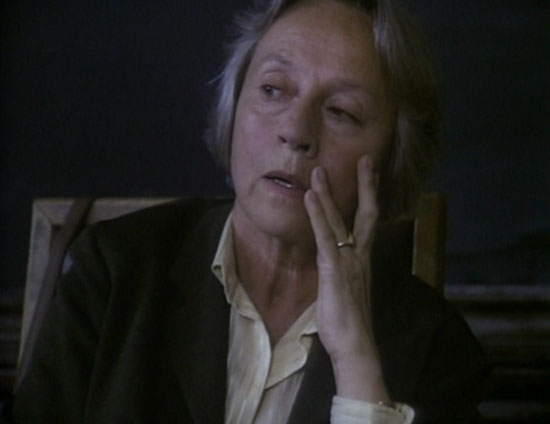
“Why do some rescue others, while others can only be rescued?”
Opens with a memory/flashback. Not showy camerawork, some handheld, a few intense close-ups. Zbigniew Preisner’s musical style is easy to recognize. Listened to hours of his soundtracks between the last episode and this one. A very good episode.
Old woman Zofia (Maria Koscialkowska, above, appeared in famous unfinished Polish film Passenger 25 years earlier) keeps herself in shape while everything around her is falling apart – pictures won’t hang straight, lights won’t stay on and car sounds like it’s always on the verge of dying. Zofia teaches a college course on ethics, featuring an extended reference to episode two (“I can tell you that the child lives”), where she is visited by middle-aged interloper Elizabeth (Teresa Marczewska, below). E. claims that as a young Jewish girl during WWII, she came to Z.’s house for protection and was turned away. Later she studied Z. from afar, wrote books about her, but wants to know why. Turns out there was some bad info about the people with E. being nazi collaborators and Z. couldn’t risk it. The women seem to trust each other now, but there’s a shady, uneasy tone to the episode, somewhat lightened when Z. comes across a friendly contortionist during a jog. At the end, Z. takes E. to a man who did help her during the war, now a tailor (Tadeusz Lomnicki, narrated Passenger and appeared in Blind Chance and Man of Marble) but he won’t talk about the old days.
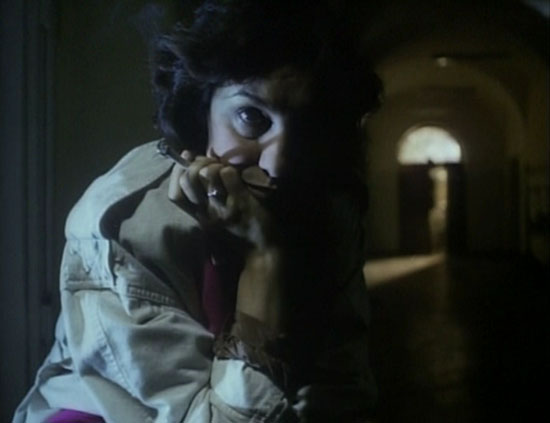
———————————-
Commandment IX: Thou Shalt Not Covet Thy Neighbor’s Wife
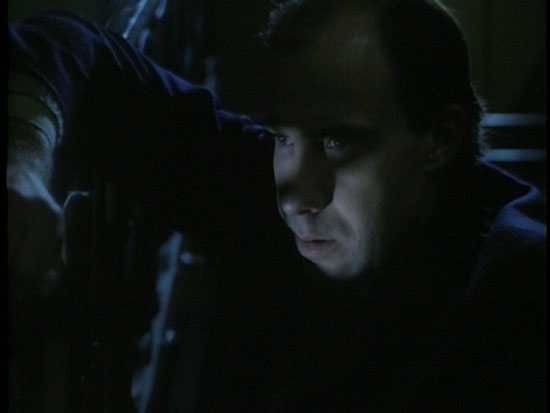
And now it’s the actual music from Blue, with heavy references to Double Life of Veronique in the story. A girl tells the surgeon “I’m not allowed to sing because my heart wouldn’t stand it” then recommends him some Von Den Budenmayer and adds “I know I’m someone else.” Cinematographer uses lots of light in almost every scene, a Decalogue rarity. Some lovely shots. Same cinematographer as part 3, later shot Red, then some random Hollywood stuff before his early death in 2001.
After former philanderer Roman learns he is impotent, he allows his wife to have affairs, but then becomes jealous and regretful. Roman hides, spies, believes that she loves the younger man more, when in fact she’s trying to get rid of him to stay with her husband. When she goes on a ski trip and Roman finds out the younger man is following her, he attempts suicide by bicycle, but survives for a tearful hospital reunion (and btw, he’s not impotent after all). Played a lot better than it sounds from my description.
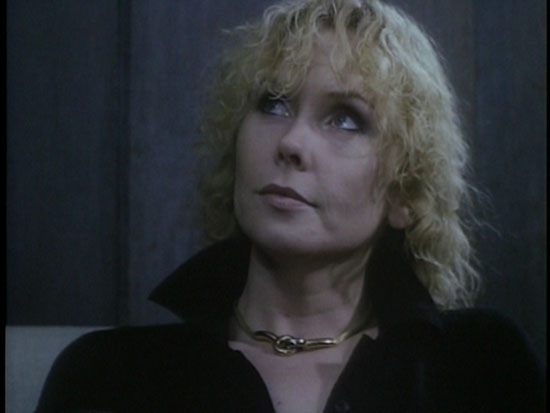
———————————-
Commandment X: Thou Shalt Not Covet Thy Neighbor’s Goods

Involves death, robbery and deception, and does not end well for our heroes, but it seems lighthearted in comparison to the others, full of dark humor. One of the least believable of the series, which adds to the humor… these guys don’t quite seem real, so their loss isn’t as sad as it might be. Had the degree of obsession they show at the end (studying new stamps they bought for a few cents at the post office) been shown before the Scott Thompson guy opted for surgery to trade his kidney for a rare stamp, it might’ve turned more into a horrifying drama than a comedy.
Lead singer of a punk act Artur (Zbigniew Zamachowski, star of White) and family man Jerzy (Jerzy Stuhr, also of White and star of Camera Buff, who looks like Scott Thompson) are brothers who unknowingly inherit the largest, most valuable stamp collection in the country from their father. First they consider selling, but they’ve inherited their dad’s collector bug as well, so they move to protect and then to expand the collection (Jerzy trades a kidney for a one-of-a-kind stamp to complete a series). But all the stamps (except that one) are stolen while Jerzy is in the hospital.
Episode opens with Jerzy singing about breaking all the commandments. A kid who scams the brothers on behalf of other collectors was Tomek, the peeping tom from part six. Minimal music, uses drum rolls for punctuation, adding to the comic effect.
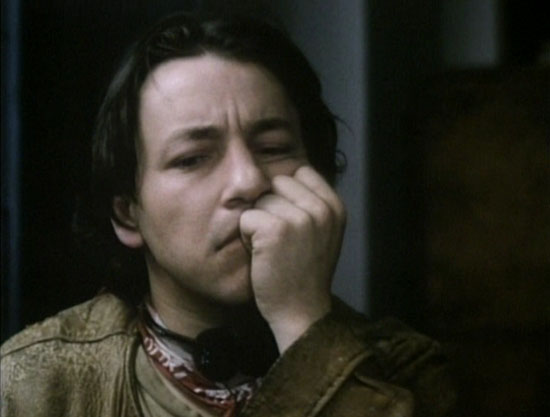
———————————-
I didn’t watch these all at once. Started this entry August 2007, posted June 2008, whew.
Kieslowski: “When you work with the ten best cinematographers in the country, a kind of contest develops. … We managed to avoid the rut you fall into when you make films that take longer than two or three months to shoot. Things were different all the time. … I gave great freedom to my coworkers and friends the cameramen.”
Here’s to the cameramen! Some more screenshots:

